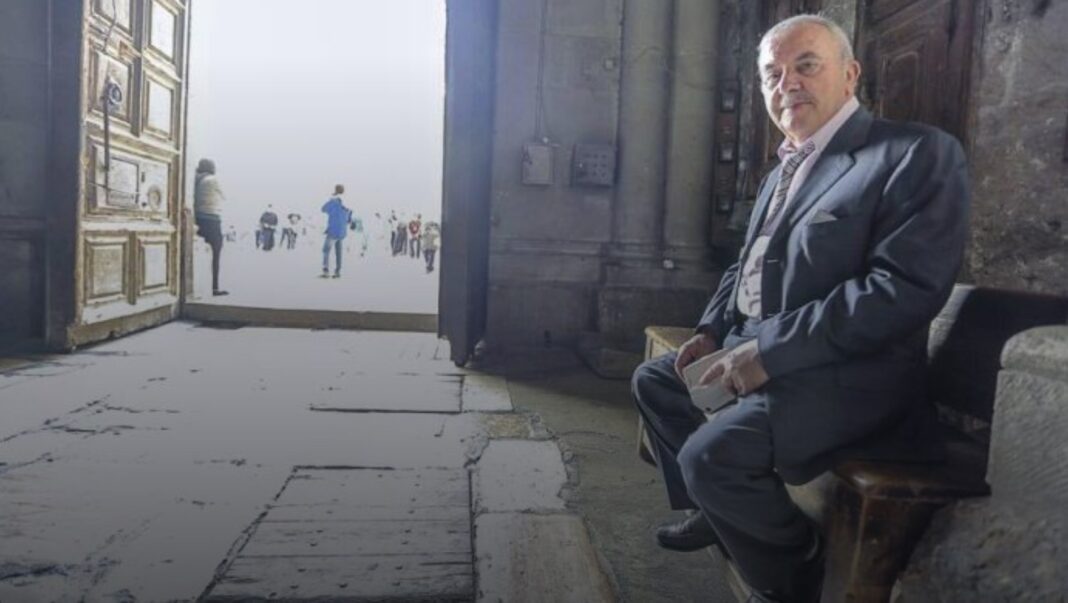For Christians of all denominations, the Church of the Holy Sepulchre in Jerusalem is one of the world’s most sacred sites, and yet each morning it’s opened by a Palestinian Muslim man.
His name is Wajeeh, and his family, the Nuseibehs, have been custodians of this church for hundreds of years.
“It started from the seventh century, when the Greek Orthodox gave the key to the family,” he says.
“Then the Crusades came, and took us away for 88 years, [but we were] returned back by Saladin, around 850 years ago.”
It is said the Holy Sepulchre was built on the site of Jesus’s crucifixion. The stone building also houses the tomb which Christians believe Jesus was buried in and resurrected from.
And so this site holds particular resonance for Christians on Good Friday and over Easter.
But for the first time in nearly 700 years, the church has been indefinitely closed due to the spread of disease.
Back then, it was because of the Black Plague — now it is COVID-19.
 Photo: The Holy Sepulchre attracts thousands of visitors, particularly during the Holy Week and Easter. (Getty images: Thomas Coex)
Photo: The Holy Sepulchre attracts thousands of visitors, particularly during the Holy Week and Easter. (Getty images: Thomas Coex) Where Apostolic, Orthodox and Catholic meet
For Wajeeh, who spoke to RN’s Religion and Ethics Report from Jerusalem, it’s deeply saddening to see the Church empty.
Given its history and holiness, the Holy Sepulchre is a popular pilgrimage site for Christians. Wajeeh says it would normally attract tens of thousands of visitors over the Easter period.
“These are very special days because it’s Easter, the holiest of the holy days in the year for Jerusalem … and many things [would normally] happen inside the Church, especially on the Good Friday,” he says.
Indeed, the Holy Sepulchre is unique — and busier than most places of worship — because it is controlled by three Christian denominations: the Roman Catholic Church, the Greek Orthodox Church and the Armenian Apostolic Church.
Each of these groups share custody of the Holy Sepulchre, and host regular liturgies for their respective congregations.
But they are not alone. The Church is also a place of worship for Coptic Orthodox, Syriac Orthodox and Ethiopian Orthodox communities, who have access to various chapels in the sprawling site.
And it’s due to the multi-denominational nature of the Church that a Palestinian Muslim family were given the keys and tasked with the daily opening of its doors.
 Photo: The Holy Sepulchre is home to Armenian Apostolic church services, like this one, led by Archbishop Sevan Gharibian. (Getty images: NurPhoto)
Photo: The Holy Sepulchre is home to Armenian Apostolic church services, like this one, led by Archbishop Sevan Gharibian. (Getty images: NurPhoto)“We are neutral,” says Wajeeh, pointing out that during the Ottoman period, there was division between the Roman, Greek and Armenian Churches, over who had control of the site.
“We open the Church for everybody, we give them the right for their processions and masses.”
Key keeper, peacekeeper
As keeper of the keys, Wajeeh is also a keeper of peace in the old city of Jerusalem.
He says while there is friction between Israelis and Palestinians over the occupation of land, he does not believe that religion is the problem.
“As a Muslim, we should take care of everybody,” he says.
“We respect the holy places, and we give respect not just for Christianity, but for Judaism, [because] we believe in the Old Testament, in the New Testament, and in the Koran.”
But until COVID-19 is no longer a risk to the faith groups who worship at the Holy Sepulchre, the door will remain closed.
 For generations, the Palestinian Nuseibeh family has guarded the Church of the Holy Sepulchre. Wajeeh Nuseibeh joins the Religion and Ethics Report. –
For generations, the Palestinian Nuseibeh family has guarded the Church of the Holy Sepulchre. Wajeeh Nuseibeh joins the Religion and Ethics Report. –
Easter is normally boom time in Jerusalem. Tens of thousands of pilgrims flock to Christianity’s holiest site – the Church of the Holy Sepulchre in the Old City. It’s built on the Hill of Golgotha, where the Bible records that Christ was crucified.
Now, for the first time in living memory, the coronavirus means Church is closed for Easter.
For generations, the faithful guardian of the Church of the Holy Sepulchre has been a Palestinian Muslim family – the Nusseibeh’s.









